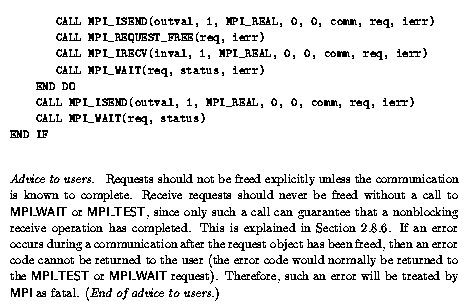A request object is deallocated automatically by a successful call to MPI_WAIT or MPI_TEST. In addition, a request object can be explicitly deallocated by using the following operation. request object, deallocation of
following operation MPI_REQUEST_FREE(request) INOUT request request handleMPI_Request_free(MPI_Request *request)
MPI_REQUEST_FREE(REQUEST, IERROR)INTEGER REQUEST, IERROR
MPI_REQUEST_FREE marks the request object for deallocation and sets request to MPI_REQUEST_NULL. MPI_REQUEST_NULL An ongoing communication associated with the request will be allowed to complete. The request becomes unavailable after it is deallocated, as the handle is reset to MPI_REQUEST_NULL. However, the request object itself need not be deallocated immediately. If the communication associated with this object is still ongoing, and the object is required for its correct completion, then MPI will not deallocate the object until after its completion.
MPI_REQUEST_FREE cannot be used for cancelling an ongoing
communication. For that purpose,
one should use MPI_CANCEL,
described in Section ![]() .
One should use MPI_REQUEST_FREE
when the logic of the program is such that a nonblocking communication is
known to have terminated and, therefore, a call to MPI_WAIT or
MPI_TEST is superfluous.
For example, the program could
be such that a send command generates a reply from the receiver. If the reply
has been successfully received, then the send is known to be complete.
.
One should use MPI_REQUEST_FREE
when the logic of the program is such that a nonblocking communication is
known to have terminated and, therefore, a call to MPI_WAIT or
MPI_TEST is superfluous.
For example, the program could
be such that a send command generates a reply from the receiver. If the reply
has been successfully received, then the send is known to be complete.
